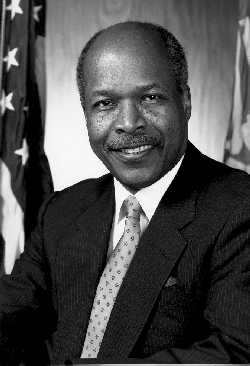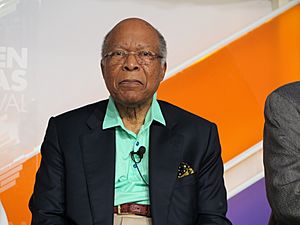Louis W. Sullivan facts for kids
Quick facts for kids
Louis W. Sullivan
|
|
|---|---|
 |
|
| 17th United States Secretary of Health and Human Services | |
| In office March 1, 1989 – January 20, 1993 |
|
| President | George H. W. Bush |
| Preceded by | Otis Bowen |
| Succeeded by | Donna Shalala |
| Personal details | |
| Born | November 3, 1933 Atlanta, Georgia, U.S. |
| Political party | Republican |
| Spouse | Eva Ginger Sullivan |
| Education | Morehouse College (BS) Boston University (MD) |
Louis Wade Sullivan (born November 3, 1933) is an American doctor, writer, and teacher. He was the Secretary of the United States Department of Health and Human Services (HHS) for President George H. W. Bush. He also helped start the Morehouse School of Medicine.
Contents
About Louis Sullivan
Louis Sullivan was born in Atlanta, Georgia. Soon after, his family moved to a small town called Blakely, Georgia. His dad was a mortician, which means he helped arrange funerals. His mom was a teacher. Louis and his brother Walter lived with friends in Atlanta during the school year. This was so they could go to better public schools there. By age five, Louis knew he wanted to work in healthcare. His family doctor, teachers, and parents all encouraged him.
Education and Early Career
In 1950, Louis graduated from Booker T. Washington High School in Atlanta. He was the second-best student in his class. He then went to Morehouse College and graduated with high honors in 1954. He earned his medical degree from Boston University School of Medicine in 1958.
After medical school, he trained in internal medicine at New York Hospital. He also studied pathology at Massachusetts General Hospital. Later, he researched blood disorders at Harvard Medical School. He became a certified expert in internal medicine and blood conditions.
From 1963 to 1975, Sullivan taught medicine at Harvard Medical School and Seton Hall College of Medicine. He also worked at Boston University Medical Center. He focused on teaching about sickle-cell anemia and blood problems caused by not having enough vitamins.
Family Life and Awards
Louis Sullivan married E. Ginger Williamson, who is a lawyer, on September 30, 1955. They have three children together. He is also a member of the Alpha Phi Alpha fraternity.
In 1992, he received the Golden Plate Award from the American Academy of Achievement. This award honors people who have achieved great things. In 2000, he received an honorary degree from Oglethorpe University.
Morehouse School of Medicine
In 1975, Louis Sullivan became the first dean and director of the Medical Education Program at Morehouse College. This program grew into The School of Medicine at Morehouse College in 1978. It welcomed its first 24 students for a two-year program in basic medical sciences.
In 1981, the school became independent from Morehouse College. It was renamed Morehouse School of Medicine (MSM), and Sullivan became its president. MSM became a full four-year medical school in 1985. It gave out its first medical degrees that same year.
Louis Sullivan was president of Morehouse School of Medicine for over 20 years. The only time he left was when he worked for the U.S. government. He retired from MSM on July 1, 2002, and became president emeritus.
Secretary of Health and Human Services
In 1989, President George H.W. Bush asked Louis Sullivan to be the Secretary of Health and Human Services. This is a very important job in the government. As Secretary, Sullivan was in charge of a big agency. This agency handles major programs for health, welfare, food and drug safety, medical research, and income support for Americans.
Key Actions and Improvements
Sullivan worked on many projects to make Americans healthier. Some of his important efforts included:
- Introducing a new and better FDA food label. This helped people understand what was in their food.
- Releasing "Healthy People 2000". This was a guide to help people prevent diseases and promote good health.
- Starting a public education program about the dangers of using tobacco. He also helped stop a new type of cigarette from being sold.
- Beginning a $100 million program to improve the health of minority men and prevent injuries.
- Making sure more women and people from different backgrounds held important jobs at HHS. For example, he helped choose the:
- First female Director of the National Institutes of Health.
- First female (and first Hispanic) Surgeon General for the U.S. Public Health Service.
- First African-American Commissioner of the Social Security Administration.
- First African-American Administrator (Acting) of the Health Care Financing Administration.
- First female Chief of Staff for the Department of Health and Human Services.
In 1991, Sullivan created the Workgroup for Electronic Data Interchange (WEDI). WEDI helps use technology to share healthcare information better. This helps improve the quality of care and lower costs. In 2013, Sullivan led a group to update the WEDI Report. This report guides how health information is shared in the future.
In January 1993, he finished his work as Secretary. He then returned to Morehouse School of Medicine and became president again.
Sullivan Commission
The Sullivan Commission on Diversity in the Healthcare Workforce was started in 2003. It was named after Louis W. Sullivan. This group of 16 experts looked at how to get more minority groups into health jobs.
The Commission found that not enough African Americans, Hispanic Americans, and American Indians were becoming nurses, doctors, or dentists. Even though these groups make up almost 25% of the U.S. population, they were less than 9% of nurses, 6% of doctors, and 5% of dentists.
The Commission talked to many leaders and experts. Their report, "Missing Persons: Minorities in the Health Professions," gave ideas on how to make the health workforce more diverse.
Sullivan Alliance to Transform the Health Professions
In 2005, Sullivan started The Sullivan Alliance. This group works to put the ideas from the Sullivan Commission into action. The Alliance became a non-profit organization in 2011.
The Sullivan Alliance does several things:
- It helps people understand why it's important to have different racial and ethnic groups in health jobs.
- It shares information about the best ways to help more diverse students get into health professions.
- It encourages schools to create new programs to increase diversity in medicine, dentistry, nursing, psychology, and public health.
The Alliance also works on projects to train more dental professionals. It also has a group that studies health differences between the U.S. and the Caribbean. This research helps us understand how things like history, lifestyle, and money affect health.
National Health Museum
Louis Sullivan is the chairman of the National Health Museum (NHM) in Atlanta. The NHM wants to teach and inspire Americans to live healthier lives. It aims to help society focus on staying healthy, not just treating sickness. The museum will have an online network called the Cyber Museum. It will also have a visitor center in Atlanta called the Experience Museum.
Other Activities
Board Member Roles
Sullivan serves on the boards of several organizations, including Henry Schein and United Therapeutics. He has also retired from the boards of large companies like General Motors and 3M.
He was the first president of the Association of Minority Health Professions Schools. He also served on important committees for universities. He is a board member for Africare and Callaway Gardens.
Other Leadership Roles
In 1985, Sullivan helped start Medical Education for South African Blacks (MESAB). He led this group from 1994 to 2007. MESAB raised money for scholarships for over 10,000 Black health students in South Africa. These students are now doctors, nurses, and other health professionals.
In 2008, Sullivan joined the Grady Hospital Corporation Board of Trustees. He also joined groups that work to improve health for all people.
Books and Publications
Sullivan has written many academic papers. He also helped write two books:
- The Morehouse Mystique: Becoming a Doctor at the Nation's Newest African American Medical School (2012)
- Breaking Ground: My Life in Medicine (2014)
Annual Sullivan 5K Run/Walk
In 1989, Louis and his wife Ginger started the Annual Sullivan 5K Run/Walk. This event takes place on Martha's Vineyard in Oak Bluffs, MA. They started it to show how important daily exercise is for health. The event celebrated its 35th anniversary in 2023. It has raised about $800,000 to support the Martha's Vineyard Hospital.
Honors
In 2024, Dr. Sullivan was named a Georgia Trustee. This honor is given by the Georgia Historical Society and the Governor of Georgia. It recognizes people whose achievements and community service show the ideals of Georgia's first leaders.
See also
 | Janet Taylor Pickett |
 | Synthia Saint James |
 | Howardena Pindell |
 | Faith Ringgold |


